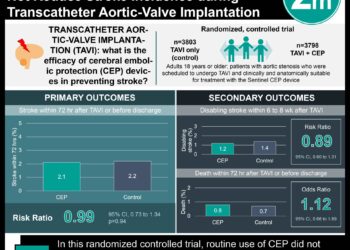Genetically modified porcine-to-human cardiac xenograft failure
1. A porcine heart was transplanted into a 57-year-old man with nonischemic cardiomyopathy without apparent rejection.
2. The xenograft started failing shortly after transplantation and life support was withdrawn on day 60. The mechanism of failure is being investigated.
Evidence Rating Level: 2 (Good)
Study Rundown: Xenopathic organ transplantation represents a possible avenue for alleviating the burden on patients and the healthcare system associated with long transplant waitlists and ineligibility for allotransplantation. In the present study, a 57-year-old male with chronic thrombocytopenia, hypertension, and nonischemic cardiomyopathy was admitted to the hospital for severe heart failure. Despite aggressive therapies, the patient continued to have ventricular arrhythmias and cardiac arrests. Due to poor treatment adherence and non-ambulatory status, the patient was ineligible for allograft transplantation. Experimental xenotransplantation was believed to be non-inferior to continued intervention. The donor pig had 10 genes modified to be compatible with the human recipient and the patient was placed on enhanced post-transplantation immunosuppression. Despite the initial graft success, the patient developed signs of infection and later, diastolic failure. Histology revealed interstitial edema, myocyte necrosis, and red-cell extravasation, without signs of immune-mediated rejection. Life support was withdrawn on day 60 post-transplantation. The current findings were not consistent with infections or typical rejection. Studies are in progress to elucidate the mechanisms behind this pathology.
Click here to read the study in NEJM
In-Depth [case report]: This was a case report of an experimental xenotransplantation from a genetically modified pig to a human recipient. Due to the patient’s declining cardiac function and ineligibility for allograft transplantation, the 57-year-old male patient was deemed eligible. The donor pig was cloned from a fibroblast cell line that has 10 edited genes. The patient underwent an immunosuppression regimen that included rituximab, anti-thymocyte globulin, complement inhibitor, monoclonal anti-CD40 antibody, methylprednisolone, and mycophenolate mofetil. Zeno-zoonosis risk was minimized through rigorous husbandry and routine surveillance. Additionally, human pathogens were also tested using plasma microbial cell-free DNA. Post-transplantation, the patient’s cardiac output was adequate and the left ventricular ejection fraction was 55%. No evidence of rejection was observed during initial testing. Subsequently, the patient developed several complications including peritonitis, poor feeding, and infection. Starting from day 49, the patient showed signs of failure of the transplanted heart, which required vasopressors, and intubation. Biopsy revealed edema and erythrocyte extravasation, without signs of antibody- or cell-mediated rejection. Despite subsequent treatment for suspected atypical rejection, signs of antibody-mediated rejection emerged alongside myocyte necrosis, indicating irreversible injury to the graft. Compassionate withdrawal of life support was done on day 60 post-transplantation. The autopsy showed a significant increase in size and weight of the heart and signs of fibrosis and scattered necrosis. These findings were inconsistent with typical xenograft rejection and efforts are underway to determine the mechanisms of the observed pathology.
Image: PD
©2022 2 Minute Medicine, Inc. All rights reserved. No works may be reproduced without expressed written consent from 2 Minute Medicine, Inc. Inquire about licensing here. No article should be construed as medical advice and is not intended as such by the authors or by 2 Minute Medicine, Inc.







![The ABCD2 score: Risk of stroke after Transient Ischemic Attack (TIA) [Classics Series]](https://www.2minutemedicine.com/wp-content/uploads/2013/05/web-cover-classics-with-logo-medicine-BW-small-jpg-75x75.jpg)